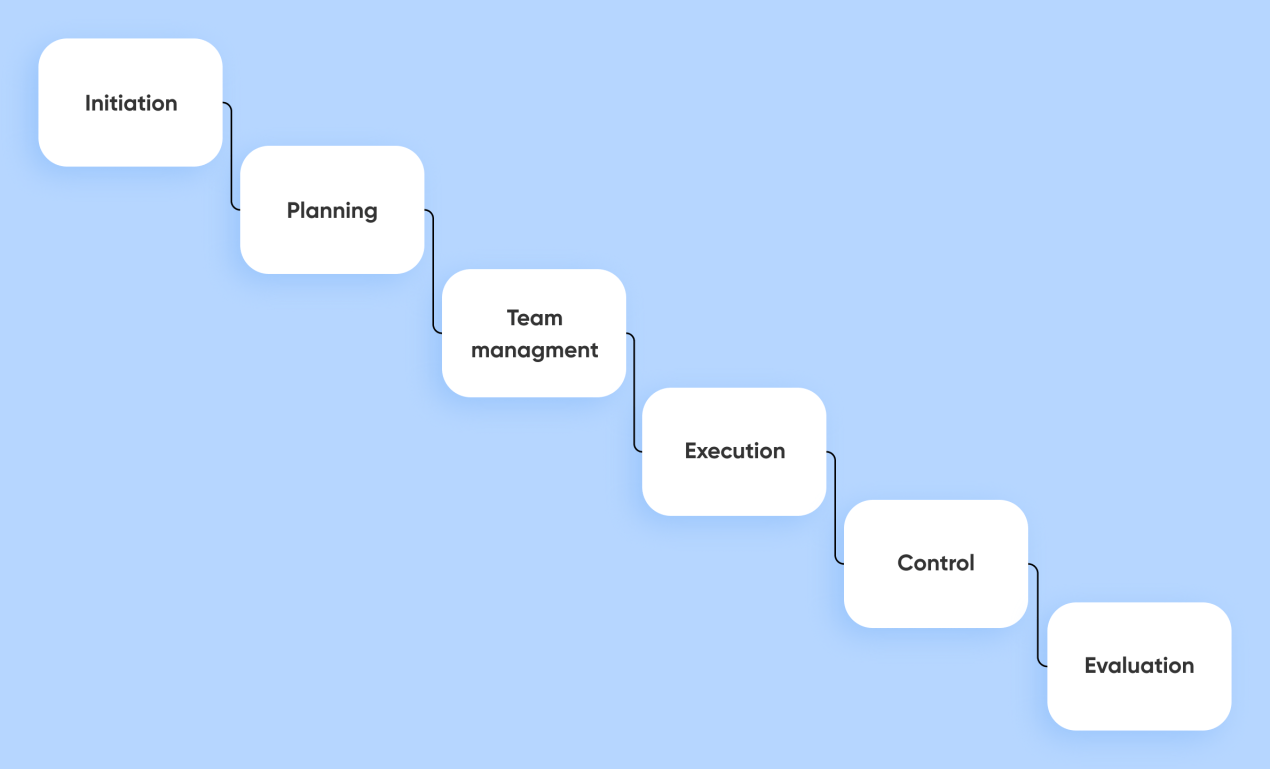A proper project management process is critical to the success of almost any project. It can be defined as a selection of methods and processes aimed to coordinate the ideas and the development process as a whole.
It is easy to assume that a small startup team at the early stages of the development process is easier to manage than a large enterprise. However, that’s not completely true, as in a smaller team each member often has many more responsibilities to take care of. Fortunately, there are plenty of tools and methods that might help in startup project management. If you want to learn more about each project management process, read further to find out.
Main project management processes
The first thing you need to know about project management methodology is that the development process as a whole can be divided into project management processes with various types of tasks in each one of them. The most commonly mentioned ones are:
1. Initiation
The stepping stone of every project is its initiation. There are still numerous steps that need to be taken during this stage, the first of which is the gathering requirements.
It’s not just about listing all the requirements for your project. They also need to be analyzed to determine the best way of implementation, and, in some cases, whether the implementation is worth the effort.
It is important to determine the boundaries between the processes, as it will help to better manage each stage and have a clear indication of when new methods need to be applied.
In the case of an external employer, the project initiation ends when they sign off on all of the requirements. However, if you are the product owner, it is up to you to determine the full list of features that your product should include. Research it thoroughly and make sure it is realistically achievable with your current team.
2. Planning
This project management process has the most impact on the stages that come next. If done right, the following project phases should go smoothly. If a single thing gets overlooked, the development may at some point grind to a halt whether you like it or not.
With the help of project planning, you will be able to determine the budget for the project, assess the timeline of the development, and get an overall scope of the tasks in front of you. Overall, you should assess the capabilities of the team, the complexity of the requirements, your quality standards, and determine the priorities for each task.
As it is still the beginning stage of the project, the planning project management process deals with high-level preparations. Each stage will need to be discussed and carefully planned before its execution — make sure to devote enough time and resources to it.
During the project planning you should pay close attention to a limited startup budget and overall uncertainty in terms of investments. Which is why it is often better to start small. However, you should always hold the doors open for the possibility to scale your project up in case you get a financial boost.
3. Team management and communication
Team management is an important part of the project management process, as it allows to better coordinate the development process. It requires certain experience in project management knowledge areas that pertain to leadership and communication, as one needs to determine the best person for the job and clearly convey the tasks at hand.
This process becomes even harder when it comes to startup teams. They are often cross-functional, meaning that one team member has multiple roles in the grand scheme. While such teams are often more effective, they are hard to manage without proper experience.
Setting up communication channels between team members is an important part of team management. Complex projects also require clear communication with third parties, like end-users, stakeholders, associates, etc.
If your team is big enough, it is effective to assign the responsibility of communication to one person from each department. Startup teams often don’t have such a luxury, so clear communication is expected from each team member, and the project manager needs to encourage them and control the process.
4. Execution
During this project management process, the product actually gets developed. The team should follow the initial plan, so it might seem that the only task a project manager has to perform is to make sure that all the tasks are done and the deadlines are met.
However, project management does not stop there. To get the job done, a lot of data should be gathered and analyzed. Reporting the data whenever needed is an important project management task that needs to be overseen by a professional.
In some cases, the development team needs to be ready to provide external reports for the third party to adjust their processes per the data provided. It is overall good practice to prepare the reports after a certain period of time (weekly, monthly), and after reaching a certain milestone.
When it comes to startups, the team needs to be flexible during the execution phase. Proper reporting and analysis practices will help the whole team stay informed about the current state of the project and any possible changes in plans that may occur.
5. Control and validation
After you have a full list of requirements and a detailed plan of action, there needs to be some sort of control over the development activity so that it matches the outlined arrangement. Other protocols that need to be followed include the quality assurance test plans and communication plans.
Even if a certain activity is not included in any plans or protocols you have prepared, there still needs to be a thorough control over the situation. It’s up to the project manager to determine the right course of action and make sure everyone adheres to it.
Validation is the process that needs to be run in the background of your development efforts at all times. It is a part of project management to constantly validate that the result of the work corresponds to the goals and expectations. Validation criteria may vary for every task, and it can often change during the development process.
Make sure control and validation do not turn into micromanagement. In a startup setting, these processes can sometimes be made a part of a self-sustaining system. Each team member can validate their own efforts against the predetermined criteria. Overall, the method can depend on the project manager and the specifics of the project itself, just make sure that there is an understanding of the process.
6. Evaluation
Last but not least, this project management phase takes place after all the determined requirements are met. As the developing process is closing, it’s time to evaluate the product as a whole against your expectations and other criteria.
The evaluation process often includes identifying the main mistakes to stop them from appearing in future projects. Good decisions and solutions should also be identified and encouraged.
If continuous support for the product is expected after its release, the evaluation process will not stop just after the end of the development either. The user feedback on the product and its features should be continuously analyzed and the changes should be made accordingly.
Project evaluation also determines the outcome of the team cooperation. So, if the project did not meet certain standards, it is the responsibility of the team as well. While it is important to pinpoint the reason for such a failure, the goal is not to place blame, but rather to learn and improve.
How does a startup benefit from project management?
While there are examples of successful startups that did not focus on managing their project, there are multiple benefits that a startup gains if it is properly managed. Let’s review some of them:
- An organized plan of action can help you avoid missing deadlines;
- A coordinated approach reduces the risks of mistakes due to miscommunication;
- A systematic approach to data makes it easier to present your project to potential investors;
- These practices encourage communication and cooperation, which improves decision making and allows for a more creative approach to obstacles;
- Smaller determined goals allow better project flexibility, which in turn helps to adapt to ever-changing circumstances startups are always in.
The benefits don’t stop there. So, if you want to raise your chances of success, you should definitely spend resources on project management.
How can you effectively organize a project management system?
Technological progress has definitely made the management of projects much easier. Certain software tools can help you effectively organize the development process. However, if you’re not familiar with project management best practices, it will still be hard for you to organize everything.
Even with the state-of-the-art tools, it takes a lot of time and effort to organize a project management system. While it is not impossible if you don’t have sufficient experience it would be much better to reach out for help. Project management efforts can be outsourced, so, if you can find an experienced team, you can hire them to organize your development process.
In conclusion
Overall, the described processes are extremely beneficial to any startup project. With the right methods and the right tools, your team will create the best product possible, while saving time and resources.
So, make the right decision and start working on organizing your project right now. The results you achieve will definitely surpass your expectations.














